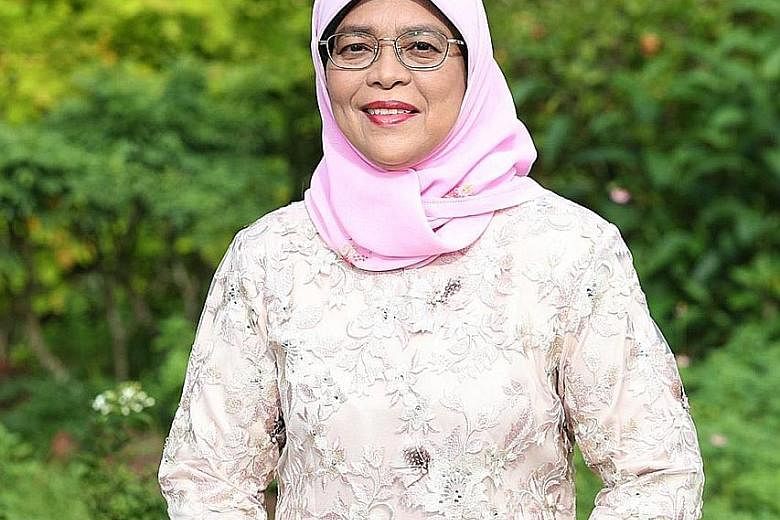A whole-of-society effort is needed for societal norms and practices to change and better support women, said President Halimah Yacob yesterday.
The issue is not just about securing rights for women, but also giving them the respect and appreciation they deserve for their contributions and sacrifices, she said.
"All of us are in a position of influence to do so," she said. "With respect as the cornerstone of the rapport between women and men, we can create a society where every woman and man can achieve their aspirations and fullest potential."
Singapore's first woman president was giving the keynote speech at the Institute of Policy Studies Women's Conference 2021.
"To ensure continued progress as a nation, it is imperative we invest, develop and maximise the full potential of every individual and support them in achieving their aspirations, regardless of whether they are women or men," she added.
"We must make it a priority for women who hold up 'half the sky' to be able to participate and contribute fully, and equally, to Singapore's development."
The conference comes amid an ongoing series of conversations, as part of a national review of women's issues. Over 3,300 have participated in some 100 sessions, and the Government will present a White Paper on recommendations for greater gender equality.
Madam Halimah stressed that it is also important to relook existing policies and social norms to respond to changing attitudes and challenges when it comes to equality between women and men.
She noted the Government is constantly reviewing its laws and policies on this front, such as the Women's Charter, which came into effect 60 years ago.
She noted that the law was ground-breaking for its time, and updates over the years have strengthened protections for women, such as on the enforcement of maintenance orders after divorce and support for vulnerable women facing family violence.
Other laws such as the Penal Code and Protection from Harassment Act have also been amended, to repeal marital immunity for rape and better protect victims of partner violence, among other changes.
Madam Halimah said while women here have made great strides, especially in education, work and community participation, "there is always room for improvement as progress is an ongoing effort". She noted that women with caregiving responsibilities, for instance, continue to face barriers at the workplace, and their propensity to take on these duties was a key contributing factor to the gender pay gap, which stood at 6 per cent in 2018.
Work-from-home arrangements brought about by the pandemic have created opportunities for women to balance work and caregiving, she added. She hoped they will continue to be available.
But she also acknowledged that women might find themselves disproportionately taking on more unpaid care work, such as their children's home-based learning.
Madam Halimah called on fathers to step up and play a more active role at home, and on employers to be more understanding.
Another area in which women face challenges is in the digital realm, she noted. She cited recent instances of harassment and bullying of women, sometimes by anonymous trolls, on social media, and technology-facilitated sexual violence against women.
While laws have been enhanced and stiffer penalties introduced to tackle these problems, she said, it is also important for society to take a stand and for schools and workplaces to take sexual harassment, including online, seriously.
"Singaporeans must send a strong signal that we condemn such behaviours, because no woman is safe from such abuses, including our own female family members.
"While technology has opened new avenues for harassment and violence against women, the attitudes that gave rise to these anti-social behaviours in the first place have been with us for much longer," she added.
Madam Halimah also said that change must take place "upstream", with young men taught from an early age that women are their equals and are to be respected.
"This is where families, peers and institutions such as schools can play a part in educating boys and girls about gender stereotypes of careers and parenting roles," she added. "We need to signal that there is zero tolerance for the degradation of girls and women in our society, and that they are valued for their contributions in the family, in the workplace, and in our society."
Tham Yuen-C


